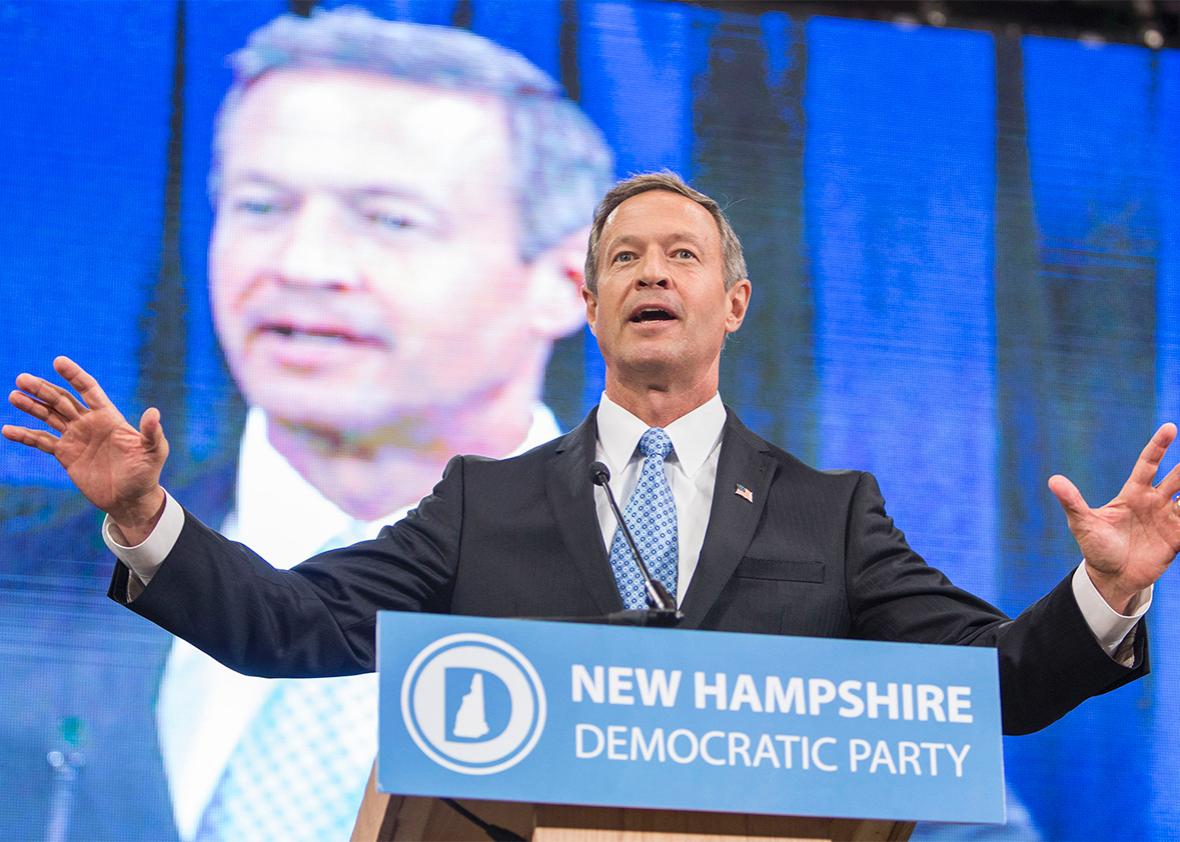LAS VEGAS—Donald Trump has changed a great many things about the way presidential primaries are supposed to work. Most obviously, he isn’t supposed to still be around right now. He’s also skewed people’s expectations of what’s supposed to happen in a first presidential debate. Typically we’d get a bit further into the season before candidates start directly insulting each other about their looks. If we recall any election before this one, we would remember that the first debates are supposed to be the ones in which candidates “introduce themselves to the country.”
And Democrats are hoping that, after two feature-length rumbles among the umpteen Republican presidential contenders, their five presidential candidates who meet at the Wynn Las Vegas resort on Tuesday night will restore some dignity to the country’s nominating process—a “more civil, substantive debate,” as Democratic strategist Stephanie Cutter put it at a pre-debate event Monday night.
“They will probably challenge each other,” Nevada Democratic Party chairwoman Roberta Lange said, “but it will be collegial.”
If Democrats can succeed in doing so—in focusing on issues, and avoiding the intercandidate venom that makes for sensational television—the party might be pleased with itself. But CNN executives surely won’t. They’ve already resigned themselves to more modest ratings. On Monday, Trump himself predicted a snoozefest: “I think people are going to turn it on for a couple of minutes and then fall asleep.”
It will be up to the non–Hillary Clinton candidates to determine what degree of combat they’ll treat the American viewing public to Tuesday night. Is it more important to knock Clinton down by going after her, even if that risks a backlash among Democratic rank and file? Or should they keep it to a humble, smiling discussion of policy details and introductory remarks, even if that risks coming across as totally flat?
There must be a balance.
“I don’t see that as really being their style,” Rep. Dina Titus, a Clinton supporter, said about whether she expected Clinton’s lesser-polling rivals to go after her for a jolt in support. Titus was appearing at a mock caucus in the Nevada Democratic Party’s Las Vegas offices to train volunteers who, for practice, were choosing between characters from The Muppets. (Miss Piggy captured the most delegates.)
“I think people are more wanting to identify themselves and let people know who they are at this stage. Because a lot of people don’t know a Martin O’Malley, don’t know Mr. Chafee,” Titus continued. “They’re going to want to put their own stamp on their own campaigns as opposed to attacking her.” Titus is one of the people who does know O’Malley. She credited him for visiting the state “often” and explained—perhaps with a friendly warning—that she “always thought he might be a good vice presidential candidate.”
The O’Malley campaign doesn’t divulge much interest in the vice presidency, but his presidential campaign needs something. Unlike former Virginia Sen. Jim Webb’s and former Rhode Island Gov. Lincoln Chafee’s campaigns, which sparked seemingly out of nowhere as pet projects for unorthodox members of the Democratic coalition, the O’Malley campaign is conventional. He is an accomplished former mayor and governor who’s been plotting a presidential campaign, obviously, for some time. He has staff across the country, he’s released policy papers left and right, and he holds events at a relentless pace.
This has gotten O’Malley nowhere. He has zero traction in polls, and he’s still unknown in much of the country. The most press he’s gotten in recent memory is over his spat with the Democratic National Committee about increasing the number of debates. That hasn’t happened, but he has one chance on Tuesday. And, as the foremost Nevada political journalist Jon Ralston bluntly stated, “O’Malley has to justify his existence” in this debate.
So … feeling any pressure?
“No,” O’Malley campaign spokeswoman Haley Morris says. “This is a great opportunity for the governor to introduce himself fully to the Democratic Party. And it’s an opportunity for him to put his record of delivering progressive results next to everybody else.” The debate, in his campaign’s view, is an “enhanced introduction.”
While Morris may not have meant “enhanced” in the post-9/11, CIA “interrogation” kind of way, you can’t help but hear the similarity in terms. “Enhanced introduction” is an apt term for the sweet spot that underdog candidates will strive to meet. They want to “introduce” themselves in a positive light while infusing said introductions with critiques of Hillary Clinton. O’Malley, for example, can be expected to highlight his long-held opposition to the Trans-Pacific Partnership, to make the obvious contrast with Clinton. Sen. Bernie Sanders will do the same thing. And then us goons in the media will write about it.
Much as it will disappoint the C-suite at CNN and casual viewers everywhere, that’s the most likely case. Ho-hum: a first, get-to-know-you debate the way they’re meant to be done, until Trump strolled along. It will be the second debate, after the seeds have been planted in the first, where the pleasantries will be cast aside.
See more of Slate’s coverage of the 2016 Democratic primary.
